|
July, 2005
Aug. 2005
Sept. 2005
Oct. 2005
Nov. 2005
Dec. 2005
Jan. 2006
Feb. 2006
Mar. 2006
Apr. 2006
May 2006
June 2006
July 2006
August 2006
September 2006
October 2006
November 2006
December 2006
January 2007
February 2007
March 2007
April 2007
May 2007
June 2007
July 2007
August 2007
September 2007
October 2007
November 2007
December 2007
February 2008
March 2008
April 2008
May 2008
June 2008
July 2008
August 2008
September 2008
October 2008
November 2008
December 2008
February 2009
March 2009
April 2009
May 2009
July 2009
August 2009
September 2009
November 2009
December 2009
January 2010
February 2010
March 2010
April 2010
May 2010
June 2010
July 2010
September 2010
October 2010
November 2010
December 2010
January 2011
February 2011
March 2011
April 2011
May 2011
June 2011
July 2011
September 2011
October 2011
December 2011
February 2012
April 2012
June 2012
July 2012
August 2012
October 2012
November 2012
ČERVENÁ BARVA PRESS NEWSLETTER
Gloria Mindock, Editor Issue No. 79 February, 2013
INDEX
Happy February!
There was no newsletter during the months of December and January.
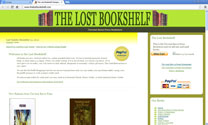
Be sure to do some shopping at The Lost Bookshelf.
We have for sale Červená Barva Press books and books on consignment
by many authors and small presses. Please support the small press!
We survive by sales! www.thelostbookshelf.com
A huge thank you goes out to all those who made donations to the press during our fund-raiser. We are so grateful to
you and very grateful to all of you who buy our books. Bill and I work very hard on the press and still remain one of
the most active publishers in the country.
Anyone who is interested in writing book reviews for the press, please contact me. I have been receiving some wonderful
books for review. I could use the help. Thanks so much!
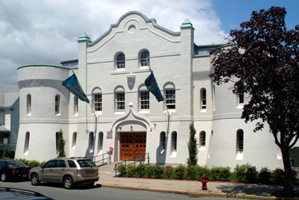
Červená Barva Press has a new space to host readings, workshops, and press work!!!
Bill and I are very excited about this. It is in the basement (B8) in the
Center for the Arts in the Armory,
191 Highland Avenue, Somerville, MA.
I have already started to schedule some readings and workshops. This is what is going on in February:
- Wednesday, February 13th, Open House, 7:00-9:00PM (Come see our new space!)
- Thursday, Feb. 14th, Open Mic Night, Celebrate Valentine's Day by reading some love poems or poems of angst, 7:00-9:00PM
- Wednesday, Feb. 20th, 7:00-9:00, Readers: Doug Holder and Steve Glines
- Monday, Feb. 25th, Fiction Night, 7:00-9:00 Readers: Ralph Pennel and Luke Salisbury
Thank you to everyone who donated money to endow a folding chair for the space. Wow!
I just ordered more of them! Thanks also for the folding tables donated. Bill and I are so grateful!
2013 AWP Conference & Bookfair
Hynes Convention Center &
Sheraton Boston Hotel
AWP is almost here. Be sure to visit our booktable, P11. All our books and chapbooks will be on sale
from the very beginning.
Two of our authors, Pamela L. Laskin
and Teneice Delgaldo will do a book signing.
Červená Barva Press will be giving a reading at AWP on Saturday, March 9th, 4:30-5:15PM in Room 209, Level 2.
Andrey Gritsman, Lucille Lang Day, and Susan Tepper,
three poets published by Červená Barva Press will read from their work.
The reading will be moderated by Gloria Mindock,
Červená Barva editor and publisher.
I am also on a panel, "The Look of the Book" with Lucille Lang Day,
Anne Coray, and Doug Holder.
Check it out on Saturday, March 9th 12:00 noon to 1:15 p.m. Room 305, Level 3.
Thanks to Bill Yarrow, Susan Tepper, Teneice Delgaldo, Susan Lewis, Lisa Marie Basile, Robert Vaughan,
Roberto Garcia, Irene Koronas, Lucille Lang Day, Barbara Murphy, Marc Vincenz, and Pamela L. Laskin for
signing up to help with the book table. I am so appreciative.
You are the best! Anyone else who wants to help can sign up at this link:
http://www.signupgenius.com/go/70A0F4DACA92EA75-awpbookfair It is never to late!
We have new books that came out since November. They are:
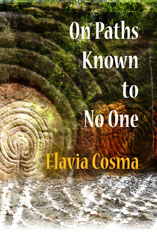
|
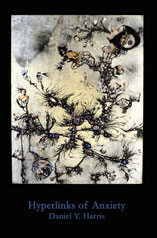
|
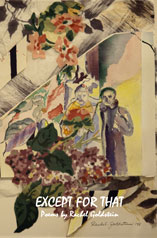
|
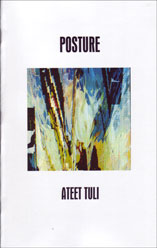
|
On Paths Known to No One
by Flavia Cosma
|
Hyperlinks of Anxiety
by Daniel Y. Harris
|
Except for That
by Rachel Goldstein
|
Posture
by Ateet Tuli
|
Please check these out at our booktable in our new space as well as at
The Lost Bookshelf.
Books to be released soon:
The Bonsai Curator by Pamela L. Laskin
My Life with Blondie by Jiri Klobouk
amores gitano (gypsy loves) by Roberto Garcia
Microtones Robert Vaughan
Imaginary Planet by Alan Elyshevitz (2011 Poetry Contest Winner)
In this months newsletter:
Ralph Pennel reviews "Flash Fiction Fridays" edited by Robert Vaughan.
Irene Koronas reviews "Melancholia" by Kristina Maria Darling.
Christian Mailloux interviews John a'Beckett who lives in Poland.
Christian Mailloux interviews Roberto C. Garcia.
Also I interview Daniel Y. Harris
and he has a conversation with Beth Benedix.
Next month:
Aimee Sands interviewed by Christian Mailloux
Photos of the new space
See you in March at AWP!!!! I can't wait to see so many of you at this conference and afterwards.
Be sure to come by the table at the bookfair!

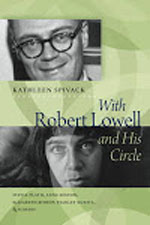
with Robert Lowell and His Circle by Kathleen Spivack
Paper, 239 pages, $19.95
Northeastern University Press, 2012
To order: www.upne.com
"The best memoir yet about Robert Lowell…absorbing and alive, human and compelling."
-Steven Gould, Axelrod, University of California, Riverside
"A Portrait (of Lowell) that serves to define his role as poet and teacher in fresh and significant ways…
This is a memoir that will make an impact right away and that will be referred to by scholars, readers,
and biographers for many years to come."
-Thomas Travisono, Hartwick College
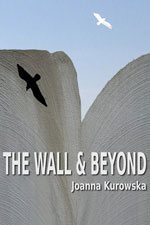
The Wall & Beyond by Joanna Kurowska
eLectio Publishing, 2012
63 pages
To order:
http://www.amazon.com/The-Wall-Beyond-ebook/dp/B009TX1EOA/ref=sr_1_1?s=books&ie=UTF8&qid=1353947566&sr=1-1&keywords=Joanna+Kurowska
FROM THE AUTHOR: As the title suggests, my recurring motif is "the wall." It reflects the confrontation between dreams
and reality; a sense of estrangement following my immigration to the US in 1988; finally, my struggle with the idea of
God against the experience of churches and theodicies. Probing the wall's nature, I come to the realization that the wall
is part of human nature. Ultimately, I strive to affirm life; to reach beyond the wall.
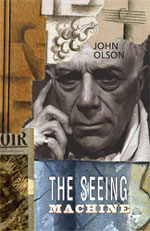
The Seeing Machine by John Olson
Fiction
ISBN: 978-1-935835-07-3
Perfect Bound, $18.00
Publication Date: November 2012
Individuals: Order directly from
Small Press Distribution,
1-800-869-7553; or Amazon.com.
John Olson can stretch the language to fit the most diverse and delicate of subjects.
With a sensibility both comic and dark, he shows the rest of us how deeply complex and various English can be.
Olson is at the cutting edge of writing today."
-Edward Foster, editor of Talisman. On Oxbow Kazoo.
To see other new titles from Quale Press, go to:
http://www.quale.com/index.html

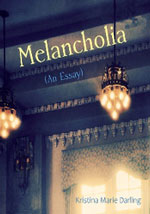
Melancholia
(An Essay)
Kristina Maria Darling
Ravenna Press
2012 ISBN: 978-0-9851520-1-7
$10.00
"1. To keep a record of what passes
in night. 2. To wake from a dream-to begin a
series of portraits instead. 3. To depict the
beloved and discover cracks in his perfectly
white teeth. 4. To experience a heightened
awareness of one's senses. 5. T ask, to
consider, to be led away from. 6. To examine
a familiar painting-to imagine a blank canvas
in its place. 7. To select and omit, as a poet
would."
In the above passages the reader is given the definition of 'noctuary'
a directive as might be read in holy verses. Darling uses definitions to
define the causes the lines impart like a creative work of Melancholia by
Durer's small print. She (melancholia) becomes the entire focus and
her tools painted within the frame become numbered sentences, verse,
tears for the departed, tears for words, for poems for the reader:
"The brass locket, which contained only an
empty frame, was the first in a series of
ominous love tokens that appeared beneath
her window..."
Darling's 'essay' contains poetic footnotes and the format is experimental.
She approaches the poetic book as a novel or a dictionary or a love
song about loss and a listing of those losses:
"...Those nights she held the inscription before
the luminous glass. His elaborate flourishes
made the text seem impassable, even
forbidding, as the light began to fade..."
We the readers are able to touch our sadness when we reach for
our own broken objects kept as sentimental pressed flowers or a
sweater that never fit, neatly folded on a shelf beside the everyday
sweat pants. We forget its there until we open this small book of poems:
"5. A little known Parisian film, in which a
woman refers to her beloved as a "strange
machine." Critics generally understand the
work as a parody of rigid nineteenth-century
courtship rituals."
The verses are gentle. Life plays with emotions,
the poems express how we save tiny scraps that at once bring
us to the larger, entire book. How definitions lead us
to a poem, how form is the opening to poetry but not
necessarily poetry.
I enjoyed this book because it is experimental and
refreshes my imagination which often gets stagnant on the
same ole same ole. This is a book to buy and read.
Irene Koronas
Poetry Editor: Wilderness House Literary Review
Reviewer: Červená Barva Press
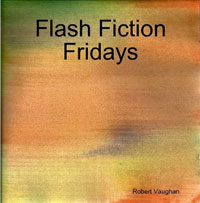
Flash Fiction Fridays
Edited by Robert Vaughan
Publisher: lulu.com
ISBN: 978-1105460937
$17.17
Order at: Lulu.com
Review by by Ralph Pennel
From page one, the collected works Flash Fiction Fridays, edited by Robert Vaughan, charges us with the task of
simultaneously reassessing our understanding of community and dispossessing ourselves of outdated ideas about the
publication and dissemination of good, necessary fiction. While major markets have failed to capitalize and promote
flash fiction to a culture that values brevity and immediacy, minor markets, both in print and online, have begun to
leave their mark on the literary world by becoming purveyors of what is ostensibly one of the most influential literary
forms of this young century. And as authors continue to seek outlets for these adapted modes of expression, and old forms
like flash are given new breath in an ever-evolving marketplace, a new sense of community has been given room to emerge.
It is, ironically, in the cultural disparity perpetuated by The New Media Era, a time when communication is largely
carried out electronically, that this renewed, even urgent sense of need for community has come into being. It is
specifically publications like Flash Fiction Fridays, and the kind of effort it takes to pool talent from authors
all over the country that save us from ourselves and the evolutionary traps we continuously design that serve to
alienate us from each other rather than bring us closer together.
Flash Fiction Fridays, a print extension of a radio program by the same name and hosted by Vaughan originally
meant to showcase the talents of authors writing in the Midwest region, came into being to meet an ever-increasing
awareness about a need to which flash fiction provided dimension. And, to evoke this awareness directly, the book, which
is broken up into sections that address specific themes, begins with pieces that are concerned with the idea of boundaries.
Boundaries of time, space, and state of being. Flash straddles the boundary between poetry and prose (a perfect
representation and conduit for the range of elasticity of boundaries born in The New Media Era), often challenging our
expectations of both through language and the space it occupies on the page and in our imaginations. "Signs" by Guy Yasko,
a brief story of under two hundred words about acceptance and reinvesting in renewing our awareness, makes a direct assault
on each of these concerns.
The piece, which sets us down right at the edge of life itself, culls us from literary and spiritual convention. And we are
not alone. The narrator who, in the very first line "missed the significance of the death rattle" (9) is with us, too, and
too suddenly aware of his own physiological limitations. It isn't until the end that the meaning of what he has witnessed has
revealed itself to him. That, "The problem is that death is something to be lived through" (9). Not up to, and not just by
those in the act of death. The line between spirit and flesh is murky at best. What relieves us of the notion that it is not
is being able to see the "signs," being able to shift our focus from the "self" toward the ethereal, toward notions of
essence that rattle, that incant, that sing, that chant, that give us permission to exist experientially beyond the body.
Though the collection itself is a celebration of community, the collection would be remiss not to acknowledge "celebration" as
the expression of community. The first story in this section, "The Wolf Who Cried Boy" by Sam Rasnake, acknowledges the desire
we all have to be accepted, to be real:
. . . the origin of literature is when the wolf comes down
from the crags, out of the dark, forbidding forest, and into the
open, crying, "Boy! Boy! Boy! (26)
We all aspire to be "boy." But more than crying to be the center of attention, more than desiring to be the sun, we want
the chance to demand to be the sun. And we know we want this because from time to time we witness aspiration manifest from dream:
There had to be a wolf, eventually-we all know this-to write
it down. A book written by a wolf-about people no less, about
trucks, banks, and pots full of water, about blazing fires and
mountain laurel, sheep and cattle. (26)
We want to know that there is value in the effort, in the act of desiring desire, too. We've only one tool by which to
measure that value: loss. Yet, in loss and in the promise of loss we are united, too.
In "Amelia" by Stephen Hasting-King from the section titled "Loss," we relive the waning moments of the aviator's life,
after she has fallen, and there is nothing to do but wait. When the last breath has left her, "she finally gives in, she
dreams of aeroplanes speeding down brightly lit runways and flying over fields populated with rows of pastries" (34), and
we mourn her life once more and that much harder because we feel more familiar, but no more equipped to save her, to save
anyone, ourselves included.
In the last line, however, we are once more granted freedom. We are once more united. We are once more at hope's birth.
For when she slips away, "in the subsequent history of atoll, Amelia is the name on a lighter among the
fragments of bone" (34) and we are free to once again imagine her among the clouds, fearless, defying everything,
even the limitations of our idealization.
What Flash Fiction Fridays awards us with is promiselessness. That is, the future of fiction and its publication is
as open as we permit ourselves to believe. This collection put together by Robert Vaughan is all the permission we
never knew we needed, the first bulb pushing through to spring.

You've founded New Europe Writers along with James G Coon and Andrew Fincham.
How did you meet these people and what inspired your long-running partnership?
By sheer coincidence. In Radio Café, Warsaw, 2006. Looking back, it strikes me as rather felicitous. Fincham was a
Brit poet, Coon an American short story writer, me an Aussie radio playwright. Those two had in mind the project of
an anthology of the fictional work of ex-pats living in Poland; I weighed in as one running a Warsaw writers'
workshop with works-in-progress, thus Warsaw Tales, our first anthology, was born; it was mostly a "foreign
writers in Poland" show. But with its part success and much kudos, Fincham proposed we next publish a "Prague Tales".
With that anth., we took on Czech work in translation, and so a "New Europe" writers anth. project began to roll, and
since then there's been no looking back, really, except our policy is to bring out occasional revised versions, the
current Warsaw Tales being one of such.
New Europe Writers publishes anthologies of stories centered around cities.
So far readers have travelled to Warsaw, Bucharest, Prague, Budapest, Ljubijana.
Where can we expect to be taken in NEW's coming years?
September this year- to Krakow. For future anths. we're considering one of the Baltic cities,
possibly Vilnius; Sofia, Bratislava and Skopje also beckon on the horizon. In content, we like to venture out,
briefly, from the capital cities into the countryside, and the village. The idea is to capture, through poetry
and very short stories, the spirit of place, the genius loci. For style's sake, we also encourage invented visions
and even magic realism. With Krakow Tales, readers can brace themselves for some pretty quirky material.
What do you feel is literature's place in honoring history and shaping the future of
national communities and identities?
Big question. In a present bombarded with information, Literature is witness to history.
Fiction has a claim to the whole truth. The facts tell us what, fiction why. It explores the psyche,
the reasons, motives for events. A national community's imagination, expressed through its poets, I would
say, is its identity. In the region of our Tales, two things are happening, (our project. is more attached
to the second); new states are emerging, reviving their indigenous languages and thus their literatures. The
other vivacious activity is Literary Translation, getting the latter known to rest of the world. As English plays
a big role in this, so must New Europe Writers, in its own small way. In our anthologies. we editors like to match,
as much as we can, the work of the expat with the local writer, for contrast, dimension, even overall plot.
Our anths. can be read like novels. Sometimes 50 writers per anthology. But in the end, the project is more
about the writing than just the writers. We're advised, of course, by local editors; and our good translators
are indispensable.
Landscapes and travel, as well as national identity come back repeatedly as themes in your own work
as a poet. How have your own observations of landscapes during your travels influenced your writing
and identity as a poet?
My interest the Polish landscape and even cityscape is what it offers at close examination, what you
dig up, as it were, when scratching beneath the surface, the fragments of its past that lie under the
cracking slabs of Soviet amnesia. And of cutting my way through the bracken of Polish language!
You have had work published in the Polish language - what part, if any, do
you have in the translation process?
I work closely with my translator, Wojciech Maslarz, a poet and English teacher himself.
I get him to know what I'm doing with language in a poem, its tone, imagery, and speech. We
agree that mine in translation must become a citizen, not a migrant of the Polish language. So,
if he has to change a scene, seek an equivalence, create a new Polish poem out of my original-
that's all to the good.
Describe your writing process - what is a typical writing
session like for you?
A mixture of agony and ecstasy. I start with scraps of things, observations, ideas, memories of
scenes, paintings even, ones that have left their mark. Piece them together, cut and paste, see if they
have the makings of a poem, mostly shelve them. I draft a lot. I get judicious advice, here and there. It's
a slow process. I miss the English-speaking pub which is the source of contemporary language for poetry. I'm
in the Polish pub, as it were, and am thrown back on English, hoping memory will toss up what matters.
Besides your work with New Europe Writers and as a Poet yourself, you have worked writing Radio plays.
Talk a bit about that side of your work and what brought you to radio.
I began with radio plays. The attraction of this medium is that it's driven by dialogue, and there's much
more freedom to explore the internal thoughts of your characters, the psychological sphere, than with a stage
play or film scenario. There's greater flexibility and since there's less production industry and organization
involved, the radio play is more immediate. I'm not strictly confined to the Polish or English pub.
What are you currently working on, and where do you see your poetry moving in the future?
After The High Country my next chap-book "Instamatics", possibly bi-lingual again. In the drafts so far,
I'm exploring, on occasion, the short dramatic monologue, instances, other voices. But all in an effort to
improve my craft.

You write in your "About me" section for the online literary community Fictionaut that "protest
spurs a thirst for knowledge and arts, literature. " Is this relationship reciprocal? In other words,
how do you feel social change can be brought about through the arts?
I believe society and more broadly, the world, helps to feed art. How we view the world around us, how
we interpret that world, and how we interact with people within the world becomes our art. So whether we
realize it or not we are creating art socially, in a sense, and speaking for or against something, overtly
or covertly, by ignoring it or addressing it with our art.
Many artists tend to believe that political art (poems, novels, paintings) is pedantic and serves no purpose.
This kind of apathy is a reflection of society as a whole. It is easy to dismiss something as preachy in order
to not deal with it. I don't think we are in an era where pedantic art, or finger wagging art, is as prevalent
as it was in previous generations. There are some wonderful poets bringing about change by educating people on
the issues in creative and craft driven ways. Some examples are Elana Bell, Thomas Sayers Ellis, Nikki Finney,
Cathy Park Hong, Aracelis Girmay, Nick Flynn and many others. If we decide to try and affect social change with
our art I believe education and discussion need to be a big part of the approach.
On your Fictionaut profile, you also mention the dominating academic influence in literature and poetry in the
modern world. Does your work address this viewpoint?
I've written poems that deal with the issue, yes. They tend to come off as kind of snarky so maybe they need
more work. As an MFA student I'm a beneficiary of the wonderful community the MFA machine has created. It is
a safe place to hone our "craft" and discuss poetry, art and literature amongst friends who appreciate that kind
of conversation. I've also built friendships I hope to have all my life at Drew University's Low Residency MFA
program, a very open and welcoming community. So there's definitely enrichment going on in the halls of academia.
However, the unavoidable result of a community is that as you are letting some people in, you are
keeping others out, sometimes by no fault of your own, but that's where the conflict comes in for me.
I know several talented writers putting out quality work, that are not MFA alums or even interested in an
MFA, and they've observed that opportunities to publish are going to more and more MFA graduates. Like many
communities, there has to be a balance overall. How do we do that? I don't know but it's a discussion we
need to have.
You keep up an arts blog on tumblr called Letras Caseras. What do you look for in writing you are considering
for feature? What do you feel is the role of technology, if any, in coaxing the literary arts down from their
academic heights?
I look for edgy, compelling and risky work. I like to be challenged, entertained and informed when I read
fiction and poetry. The same goes for artwork, photography and short films. I'm mad for work that evokes
that old school notion of beauty and art for art's sake as well. So it's a mixed bag.
Today technology is essential to the artist for reaching people and for staying connected with other art
communities. Through social networks and online communities we could bring people from both worlds, academic
and non-academic together. Unfortunately, it can also be an artist's worst enemy because it can distract an
artist from her/his works.
What can writers be doing to engage the non-academic, down-to-earth aspects of human nature and culture?
I can't speak for anyone else but I don't find myself writing to engage a specific anything. I write what
comes out of me and as I revise it and work at it, the work takes a shape and then it falls where it will.
I think all writing is addressing some aspect of human nature and culture based on what we know and experience
so…I don't think there has to be some great effort through the work, the work should be natural. However,
social events and discussions are always good ways to engage with people.
How have you addressed aspects of identity such as race, gender, and socio-economic status in your writing?
My poetry manuscript, which is still in development, deals with all of these issues. I'm trying to tell people's
stories but more than that make readers walk in the shoes of those struggling with race, gender, and
socio-economic discrimination and its challenges.
Your fiction was included in The Lost Children Charity Anthology. What was it like being part of this project?
It remains extremely rewarding to be a part of The Lost Children project. Thomas Pluck, a wonderful writer,
did a great job pulling it all together. All proceeds go to help protect children and that is always a worthwhile
and necessary endeavor. The entire collection is full of evocative and powerful stories of child abuse and neglect.
I'd like to ask anyone reading this interview to buy a copy. The money is split between PROTECT, a national
pro-child, anti-crime membership association established in 2004 and the U.K. version, Children 1st.
PROTECT lobbies for legislation that protects children from physical, sexual, and emotional abuse.
PROTECT is recognized by the IRS as a 501(c)(4) nonprofit. The project is a great example of art
for social change.
In your poem titled "Searching for a poem," you mention Duende. What does Duende mean to you,
in terms of both the folkloric figure and the artistic concept?
Firstly, it's scary. The notion of an evil or mischievous spirit is scary. In the folkloric sense it
doesn't do too much more than provide material for scary stories. But if we think of it in terms of the
artist it is fascinating and necessary because sometimes, the risks we take as artists, take us to dark
places. According to Garcia-Lorca it is imperative to have Duende to create real art and I agree.
Whether we call it Duende, emotion, feeling or whatever, it is critical to good art.
Please, talk a bit about your chapbook Amores Gitanos, your forthcoming chapbook through Cervená Barva.
What themes are present in this work?
The themes are love, lust, and longing. Ideally, they will function as little vignettes but with some
interconnectedness. Within those themes of love, lust and longing is also the relationship we have with
our art, the poems are a kind of Ars Poetica and the lovers also representative of the artist and the Muse.
The book's tension demonstrates that lust and Duende in particular are like being in a tug of war. I'm
just trying to do something new and interesting in connecting love and lust and the wildness of the heart
to the wildness of art.
What is your favorite place to write?
I have two favorite places to write: The first is the island of Dominica. Being surrounded by all that
natural beauty and the ocean, it opens me up. I've made some great friends there as well, really good
people. It is the best place I know of to escape from the world.
Two is New York City, anywhere in New York; the subway, the park, a café a bar, anywhere. It is the best
place I know of to be immersed in the world.

Interview by Gloria Mindock
Červená Barva Press Newsletter
Hyperlinks of Anxiety
Daniel Y. Harris
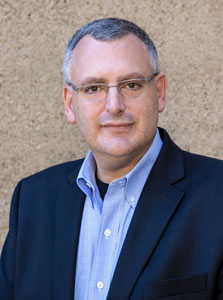
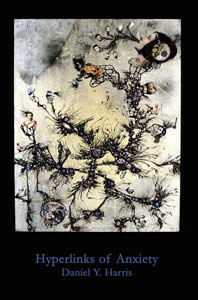
When did you first start writing poetry?
I began writing poetry in the margins of an edition of Rimbaud, Complete Works, Selected Letters, translated with an
introduction and notes by Wallace Fowlie and published by the University of Chicago Press. I was 14. It was 1976. If
my memory is serving me well, that is if my memory isn't playing multiple games of spin, I considered this early practice
of writing in the margins of books both hermetic and rebellious. I would, in some cases, literally put a line through words,
as if to erase the words but leave a mark, in order to replace them with some innovative trope of adolescent angst.
I would then write in the tiny horizontal space between sentences and extend my own, new formations to the edges of
the page. This was done in pen. For me, at that age, pencils were the instruments of schoolroom dogma and protocol.
These snippets of my early swerves into stanzas were the only things that I felt were pure. This purity was the
imaginative defiance a highly sensitive young man such as I was, needed to claim as the first strands of identity.
I went on writing in editions of Camus, Kafka, Verlaine Poe and HP Lovecraft, among others until the age of 16, when
I began the first of many multi-genre literary and visual journals, filled will early poems slanted toward the macabre
accompanied by countless collages and ink drawings. I have maintained a resolute practice of writing every day since
the age of 16, or for 34 years.
Are you open to all styles?
I am certainly open to all styles, but must admit that I am most inspired and stirred by experimental, symbolic,
surreal and avant-garde styles. I have spent over 30 years reading and analyzing the work of Paul Celan, Wallace Stevens,
Hart Crane, John Ashbery, A. R. Ammons, Edmond Jabes, Octavia Paz, Federico Garcia Lorca, Ted Hughes, Charles Baudelaire,
Stéphane Mallarmé, Samuel Beckett, George Oppen and Geoffrey Hill, in addition to the 13th century kabbalist and
author of The Zohar, Moses de Leon. I have been influenced by Romanticism, Transcendentalism, Symbolism, Dadaism,
Surrealism, Modernism, Psychoanalysis, Chromaticism, Deconstruction, Hermeneutics, Modernism and Postmodernism. With
that said, I have accompanied my study, and at times, obsessive interest in the experimental with the mystical and
theosophical disciplines of Kabbalah, Alchemy, Hermeticism, Gnosticism and the Occult. In the discrete regions between
periphery and core, between closure and opening, between atheism and observance, neither reified nor trending, I have
been seeking a new literary style to accommodate a more complicated and idiosyncratic humanity emerging in the new
millennia.
You are an artist also, talk about your collages and paintings?
As with poetry, literature, literary and critical theory, I have assembled a coterie of visual artists who have
informed my aesthetic sensibilities. As mentioned, my first poems were written in a famed Wallace Fowlie translation
of Arthur Rimbaud. My first sketches were drawn inside an art book entitled Picasso: Peintures 1900-1955, published in
1955 featuring Picasso's paintings between 1900 and 1955 in the Musée de Arts Décoratifs in Paris. The book was written
in French and came equipped with evocative and poetic depictions of each of Picasso's works in the exhibition. It was my
first encounter with "Guernica." I had my own Jean-Michel Basquiat moment, at least as depicted by Julian Schnabel in his
1996 film, Basquiat. I had an epiphany with a deep sense of self as gnosis, turned the page and began sketching below
Picasso's "Portrait de Femme." These thin-lined sketches evolved into thick-lined sketches of semi-human forms drawn
perched above geometric cityscapes. I would evolve from sketching in art books to creating multi-genre literary and visual
journals, as mentioned, by the time I was sixteen.
Over the next several years, my appetite for knowledge of artists and art movements intensified. I researched the art
of Joseph Cornell, Robert Rauschenberg, Jess, Max Ernst, Marc Chagall, Marcel Duchamp, Jackson Pollack, Edvard Munch,
Henri Fuseli, Man Ray, Louise Nevelson, Wallace Berman, Christian Boltanski, Hieronymus Bosch, Mark Rothko, Roberto Matta,
Francis Bacon, Jean Tinguely, May Ray and Alberto Giacometti. It was during these formative years that my notion of a
dynamic aesthetic self burgeoned. The only way to access the daemons, demiurges, golems and ministering angels buried
in one's mythic mind, or so I thought, was to render them poetically, visually and musically. The imagination was, at
that time, a crisis of transmission which had to be attended to and repaired on a daily basis. This is still the ethos
in which I create today, although tropes from literary theory such as "the uncanny," "negation," "the sublime,"
"creation out of catastrophe," "Orphic self-reliance," "divination," "apotheosis" and the gnostic "pleroma," and
kabbalistic "Shevirah," are part of my normative or quotidian life.
The corpus of my visual art consists of paintings, ink drawings, mixed-media collages, assemblages, found-object
sculptures, installations, photomontages and digital art. Au fond, as the French say, I am a maker of golems. In my
phantasmagoric world, replete with homunculi, anthropoids and adamic creatures formed by some remote and idiosyncratic
holy source, I have invented bizarre and arcane dramatis personae to accompany me as I maneuver between worlds.
These worlds include the underworld, the quotidian world and the over-world, as well as the vast and intricate webbing
spread between each and creating hybrids.
I have exhibited my art in museums, galleries and alternative art spaces. My art has been featured in Hollywood films
and used in stage sets for the theatre. It has been purchased by art collectors and been published in many journals,
reviews, quarterlies and websites. I have also had the good fortune of having had numerous artworks featured on the
cover of books and literary journals. In the last few years, my art has been used for the covers of Poetry Salzburg Review
and Zeek: A Jewish Journal of Thought and Culture, as well as used for the cover of Mark Pawlak's poetry
collection, Jefferson's New Image Salon, published by Červená Barva Press.
Do you ever combine your visual art with your literary writing?
On my website, www.danielyharris.com, I have created an
Art Gallery that features an exemplary portion of my body of
visual art with accompanying literary work formatted in a text box. Here is an example of one of my visual artworks
and one of my literary writings as a combined work: "Postpartum" is a post-ekphrastic hybridized work in which the poem
and artwork bear the same name but reach beyond each other forming a syncretic third.

Titled: Postpartum
Mixed Media Painting, 30 x 40
www.danielyharris.com
Postpartum*
It's an acronym.
Chiaroscuro lent
to outcomes
when shadows die
on doomsday
Monday
just in time
to watch the clock
give too much
to limbs
and fingers.
Evidence is about
to surface. Amniotic
earths mark the sky.
I try to set fire to myself.
She tells me of baseness,
my wife, the paint
in this ruin of brush.
Vellum
of fear. Hedge against
breaking.
*From Hyperlinks of Anxiety, Červená Barva Press, 2012.
First published in The Istanbul Literary Review, Edition #13, January 2009.
Talk about your chapbook, Paul Celan and the Messiah's Broken Levered Tongue: An Exponential Dyad, from Červená Barva Press.
Paul Celan and the Messiah's Broken Levered Tongue: An Exponential Dyad, published by Červená Barva Press in 2010,
was co-authored with Adam Shechter. Adam and I became friends immediately after he solicited me to submit poetry to his
newly formed journal, The Blue Jew Yorker, in the winter of 2007. Deeply impressed with Adam's own literary work and the
direction of his journal, I said on the phone to him in early 2008 that if Paul Celan were alive today, he would be submitting
to The Blue Jew Yorker. We then spent a brief spell discussing what Celan's poetry would be like in the first decade of the
21st century and the state of contemporary Jewish poetry. The idea of co-authoring a book by emailing text back and forth
came into being during this auspicious conversation. Adam, from New York, and I, from California, began
writing Paul Celan and the Messiah's Broken Levered Tongue in March, 2008. We completed the work in May, 2008.
The entire 60-page manuscript was composed without interruption in a three month period by emailing text back and forth,
as mentioned, continuing on with blinding inspiration where each of the other had left off.
Paul Celan and the Messiah's Broken Levered Tongue was published by Červená Barva Press, nearly unedited.
It was an act of pure, spontaneous imagination melding two distinctive voices into a common, yet multi-tiered, experimental
narrative whose ethos is deeply Jewish. Adam and I adapted the Rabbinic, Talmudic, Midrashic and Kabbalistic infrastructures
within the historicity of Judaism and mixed it with experimental poetry and narrative.
Paul Celan and the Messiah's Broken Levered Tongue was picked as one of "the five most important Jewish poetry books
of 2010" by the staff of The Jewish Daily Forward. Adam and I created a cast of characters based on actual historiography,
the biography of Paul Celan, our own autobiographies and literary invention. The reader will find a version of
Paul Celan himself, The Messiah, Daniel Y. Harris, Adam Shechter, The Mother Encoding, Bystander,
Minister of the Interior, Shabbatai Tzvi, Nathan of Gaza, Shekhinah, The Artist, The Lubavitcher Rebbe,
The Baal Teshuvah, Caretaker, The Group of Tourists, David Alroy, Benjamin of Tudela, Adam Kadmon and God.
Amid the apparent stylistic schisms inherent in the book, the incessant wordplay, the proleptic and historical
provocations and tragicomic theosophy, there are the tropes of fracture and repair that exemplify the
historiography of Judaism.
Adam and I are deeply grateful to Gloria Mindock and Červená Barva Press for publishing a chapbook which
makes such great demands of the reader. It exemplifies Gloria's deep commitment to the new literature of our
time. Lastly, the brilliant title of the chapbook was Adam's idea. The cover image was created by the two of
us.
Talk about your book Hyperlinks of Anxiety, from Červená Barva Press.
Hyperlinks of Anxiety, published by Červená Barva Press in 2012, spans the gamut of my literary career.
Poems contained therein, such as "The Composer," were published in the late 1980s. Other poems, such as "Deviser 22,"
were published in 2011. With Hyperlinks of Anxiety, I feel that I have reached a certain crescendo, roughing the periphery
of a matrix replete with the language of Kabbalah and digital technology. I have sought to illuminate a wide array of
literary styles, while balancing between nihilism and transcendentalism. I have also sought to burrow through the minutiae
of self and identity to conjure myself as an inventor, engraving tropes of originality from the littered density of the
literary canon. It has always my desire to push the boundaries of form and style, but not to push with a certain impossible
obscurity, futility, abstraction, disdain, flippancy, or politics du jour. My boundary-pushing has existed and continues
to exist within the inventive strains of meaning, seeking to continue from the literary genius of my precursors, by
expanding the container in which meaning is held. The most insightful and compelling insight into the ethos
of Hyperlinks of Anxiety has been rendered by Beth Benedix, in her opening essay to Hyperlinks of Anxiety,
"Barely Listening: A Meditation on Daniel Y. Harris's Hyperlinks of Anxiety:"
The world Harris describes in his collection is precarious and deeply intimate. It is a world of the starkest immediacy
and relevance, a world that presents a series of drastic either-ors at the same time that it tentatively points to a middle
path, a means, perhaps, of navigating safely through the morass. The title announces the reciprocity, or perhaps better,
the parasitism, that serves as the basic mechanism of this world: these hyperlinks produce anxiety and are produced at
breakneck speed by the anxiety that, no matter how fast we're traveling, how desperately we seek and crave connection,
we're moving farther and farther away from authentic, embodied, visceral encounter. Where can the capacity for the sublime,
for the sacred, even for the wish for the sacred be in the midst of this "hyper-real" movement, of this movement towards
the hyper-real? And what happens when the wish is altogether muted, when the search for Other is trumped by
self-promotion?
|
I have spent years perched and brooding over poetry: Baudelaire's Les Fleur due Mal, Joyce's Finnegans Wake,
Crane's The Bridge, Steven's The Auroras of Autumn, Pound's Cantos, Eliot's Four Quartets, William's Patterson,
Merrill's The Book of Ephraim, Ashbery's Self-Portrait in a Convex Mirror, Ammons's Sphere: The Form of a Motion
and Hill's Canaan. I have also spent years perched and brooding over literary theory and philosophy: Nietzsche's
The Birth of Tragedy, Freud's Moses and Monotheism, Emerson's "Nature," "The Over-Soul," and "The Poet,"
Benjamin's Illuminations, Scholem's Major Trends in Jewish Mysticism, Levinas's Totality and Infinity, Derrida's
Writing and Difference, Ricoeur's Figuring the Sacred and Bloom's A Map Misreading and Kabbalah and Criticism.
Still perched and brooding, I have also spent years reading the hyper-inventive kabbalistic work of rabbinical
figures such as Isaac the Blind (Provence, d.1235), Elieazar of Worms (Worms, d.1238), Moses de Leon (Arévalo, d.1305),
Abraham Abulafia (Comino, d.1291), Joseph Gikatilla (Peñafiel, d.1305), Isaac Luria (Safed, d.1572),
Judah Loew (Prague, d.1609), Nathan of Gaza (Macedonia, d.1680), and Nachman of Bratslav (Ukraine, d.1810).
By adding the expansive and hyper-nuanced lexicon of the digital world, which is the lingua franca of our time,
to the above cited coterie of influences, I created Hyperlinks of Anxiety.
A Conversation Between
Daniel Y. Harris and Beth Benedix
Confluence and the Uncanny
In early 2011, I received an email from someone named Josh Goldberg. Josh had found me Googling for
"Jewish Surrealism," and had come across Jake Marmer's review
of Paul Celan and the Messiah's Broken Levered Tongue: An Exponential Dyad co-authored with Adam Schechter and
published by Červená Barva Press, in The Jewish Forward. In the review, Marmer welcomed Adam Schechter and me
to the "family of Jewish Surrealists and Dadaists." As it turns out, Josh Goldberg was a renowned painter
interested in researching literary figures identified as Jewish Surrealists. He purchased a
copy of Paul Celan and the Messiah's Broken Levered Tongue, as well as my first book, Unio Mystica,
published by Cross-Cultural Communications in 2009. A few weeks later, Josh emailed me to say that he
knew Beth Hawkins, who was now called Beth Benedix. I had mentioned Beth's name on page 57 of the
Celan book as one of Beth books, Reluctant Theologians: Frank Kafka, Paul Celan, Edmond Jabès, had had
a strong impact on my understanding of these three most important Jewish literary figures of the 20th century.
No one had better described Kafka, Celan and Jabes as dispensers of holy writ than Beth had done in her
classic study.
My response to Josh was, "are you sure you mean Beth Hawkins, the author of Reluctant Theologians?"
He was sure. Beth was Josh's longtime friend. In fact, Subverting Scriptures, edited by Beth Benedix and
published in 2009, has a painting by Josh Goldberg on the cover. Josh said that he'd let Beth know that she
had been mentioned in the Celan book. I was delighted, but didn't expect to get the most delightful,
well-crafted and highly literary email from Beth within a few weeks. Beth's email began a correspondence
between us that continues to this day. Beth and I experienced an uncanny quality in our emails, a confluence
of our spirits which enabled us to burrow into the most intimidate of literary spaces.
Beth
Daniel, when I try to pinpoint where our correspondence first began, I keep starting and stopping, stammering and
faltering. Yes, Josh was technically the force that brought us together. But Celan and Jabès were the matchmakers
of my relationship with Josh. And so it seems to me that the three of us have always been in dialogue; it seems
to me that somehow the gesture to dialogue, to its essentiality, is what links us to one another.
Daniel
How do we take something that occurred between us, outside the context of language, and then redirect it to a
place of language? The sentiment that occurs to me is that there was a very interesting moment of contact between
us that became a confluence bringing to language the ultimacy of a sacred silence. We began a series of spontaneous
emails that were not exactly in the spirit of 21st century emails, but were more reminiscent of 19th century
correspondences. It felt like we were writing these plumed letters back and forth, between words and worlds,
beginning an organic process of melding our spirits. I found in you a place where disparities could flourish
untainted by cynicism. I found in you a reader and a writer unafraid of complexity and unwilling to succumb to
the pressures of fashionable sarcasm and the oversimplification of ideas. I found in you a savvy mind, sweet
heart and kind soul, who would be at home in the multiple lexicons of kabbalah, surrealism and the classical
canon of poetry. During our correspondence, I reached into my interiority through our engagement and began to
better understand the massive revisioning that I had undertaken in Hyperlinks of Anxiety and its ultimate
metamorphosis. My relationship with you, Beth, is a semaphore in the continuum. I better understand myself,
my work, Celan, Kafka, Jabès and even Judaism to which I have been so intimately attached for my whole life.
All of a sudden you came along and you began to solidify for me how I understood what I was doing. This is an
incredible thing. I find myself in one of those rare moments where I am at a loss for words. In years of reading,
I have never actually read of a writer who learned more about their own work from someone else writing about
their work. How do you thank someone for this?
Beth
Thank you so much, Daniel. I've felt at a loss for words in the face of this whole… encounter. I'm just
overwhelmed by the feeling-that what you say is possible, that I could have possibly played this role for you.
Daniel
I was deeply touched by another one of those moments in our correspondence, when you said that in reading
Hyperlinks of Anxiety, and in writing your essay for the book, you remembered why you began your career
interpreting Kafka, Jabès and Celan.
Beth
Yes, it did.
Daniel
There is a genuineness and purity about a kind of reading which gets to a deeper or even holy source. Perhaps
this gets compromised by the demands of a professional, academic life. Our confluence seems to have rekindled
your relationship to Kafka, Celan and Jabès, of whom you have written so beautifully and perhaps to literature
in general.
Beth
It did. I mean, it was kind of a crisis of conscience for me. I was reminded in reading your poetry of the kinds
of questions that I have always thought were the most meaningful questions; it wasn't that I had forgotten to ask
them, because those are the kinds of questions that I'm drawn to, but I had forgotten that they can exist in a
literary sphere. Because I'm looking for something embodied. There's a quote from Flaubert's Letters, picked up
again by Kafka, that has always stuck with me. One day, on the beach, Flaubert watches his sister and her children
and thinks to himself, "they are in the real." As I imagine it, he says this with such wistfulness, and with
tremendous humility for the knowledge that that is something he can recognize but won't ever be able to possess.
I've straddled that space in the past, and I've made something of a conscious decision to jump over into "the real"
and stop with all that wistfulness. But, then again, there was-and is-something so excruciatingly beautiful to me
in that image of Flaubert's (and more so, Kafka's) looking on, a vulnerability that cries out for protection, for
understanding. Your work really did remind me why I have cared and (perhaps despite myself) continue to care about
all this, because I hadn't cared for a while. I know it sounds really terrible to say that, but it reminded me that
it doesn't have to be this sort of wholly theoretical, ivory tower approach to the world, that the questions you
are raising are about how we are interacting on the deepest level, and that's what draws me so much to your poetry,
in the same way that I'm drawn to Celan, particularly, and Jabès, it's that kind of central wound, right? That pain
that cries out for understanding?
Daniel
Right! I can't tell you how many times I have read and re-read your essay "Barely Listening: A Meditation on
Daniel Y. Harris's Hyperlinks of Anxiety." I read the essay not out of ego, but rather out of a need to understand
Daniel Y. Harris, or myself. It is also in part a desire to know other people, or "the Other," as it has been
obliquely rendered by criticism, and in part a desire to know you Beth. I'm sure that we as poets and writers
don't always have a complete understanding of what we are writing or who we are as people. We think we do. We
create an imaginative space as a vessel to contain ourselves, surround ourselves with multiple images of ourselves,
and feel content in this vacuum. We don't, actually. We yearn for a deeper bond. I think that there is a certain
kind of sickness that occurs to a poet who reaches into the innards of the symbolic and tries to blend, align or
unify multiple types of disparities. It can make you very self-conscious or awkward or misunderstood, or all these
different things, no matter how normal you are in life with a spouse, children and a regular job. I feel, Beth, that
we provided a kind of medicinal quality for each other. You released multiple repressions of my self-absorption and
showed me that I had sought to reconcile as many disparities as I could conjure for the sake of finding our lost
humanness. This is medicinal, curative, and perhaps even a tad shamanic. You made me a happier person, which is
quite strange as I'm not an unhappy person.
Beth
That's really interesting. I like how you use the word medicinal. That's kind of how it feels to me.
Because to me… the way I approach writing about poetry like yours is to enter into it and consider it a
puzzle that has to be deciphered and illuminated. Once it's begun, there's no real choice there, but compulsion.
It speaks to me; there's a prophetic quality to the encounter. I have to enter it from the inside and try
to figure out what it is saying to me, but not only to me. For me, it's about the message it provides-and
I realize as I say this how lofty and overblown and ego-driven this sounds, and so I cringe as I say it-for
all of us, for humanity. It's prophetic, a calling back into relation and a condemnation for how we could
have fallen so far. I feel an immense sense of responsibility to hear what is being said, to really listen.
I can't really describe it in any other way… It's so totally unique when I'm in that space. And that's the
space I was in when I was trying to puzzle through Hyperlinks… the same emotional space Celan and Jabès
propelled me into. It's as you say… their task, and yours, is an attempt to reconcile any number of oppositions
and dichotomies. In the space of that… enormity… I feel an intense obligation to find a prescription. That's what
it is. It's only useful, it's only applicable, it's only ethical if there is a prescription. And that's what
I set out to do with Hyperlinks: to find a prescription, to communicate the prophetic utterance, to hear what
the words were telling me about how to live. I was struck on a visceral level that you were describing and
prescribing a healthier way to live, a more medicinally sound way to live, and it was my task to figure out
what you were telling me, so that I might translate it for others. It's very hard to explain.
Daniel
I've read a lot of critics over the years that have talked about the removal of the author, almost the Derridean point
of view, but that's not what I'm saying. It's not the removal of the author, it's that the author-me-who writes the poems
is only that person during the time that they are writing the poems. It's not situational, but rather a temporary
emersion experience captured in words and authored by an interrupted eternity. Poetry, or perhaps even the poesis,
seems to meander through my body like a vein-wrapped continuum. Once I sit at my computer, or hand-held device to
compose, I actually feel post-experiential. The motion of the body intending toward the stanza is a supreme fiction
which occurs after the fact. Still, all intention and intensity congeal into focus and the words emanate out, form
and cool to a still line of a burgeoning poem. I become, at that moment, a golemic figure creating golemic entities.
I lose identity. I gain identity. I exchange identity. All flickers and is alive at a level of crystal clear clarity.
Then, there's the return to the space left behind. This evening let's say, twenty-seven lines of poetry were created
but the poem remains incomplete. We're tired and it's bedtime. Who are we when we return to the space? I'm not always
sure. I reach out to a holy abstraction for a sense of confluence and ethos, for the golemic figure that I was the night
before, but I'm never sure that it's the same figure. Am I a persona, an actor, a mutant, an intuitive, an opportunist,
an imitator or any host of dysfunctional amalgams that comprise my personality at any given moment? At some point, the
poem is finished and the book is complete. With the euphoria of completion, comes the terrible dread of completion. It
is something akin to death. Other writers have experienced this-that we'll never write again, that it's over, that that
moment is absolutely gone. I think Jabes suffered from this terribly and went through a crisis when The Book of Questions
was finished. He was an asthmatic, stranely enough a condition that also ails me. Ultimately, this whole thing comes down
to having the chutzpah to grab a piece of the continuum, solidify it, sculpt and finally name it. But then again, once
that's done, it goes back into the ether.
Beth
I'm so intrigued by your process as a writer, and intrigued, too, that my process mirrors yours to a great extent.
To me, my dual roles in reading are to bear witness and to listen attentively. But in this listening, this witnessing,
I go through that same process of euphoria and dread, and that's exactly how I approach the process of sitting down to
figure out this puzzle that's set in front of me. It is euphoria when I feel like I have been able to see into something
that I couldn't see into before. That's the only possible word I can use to describe it, euphoria, not for its
own sake, but because, again, of the prophetic quality of the encounter. Not that I'm prophetic (cringing again
at the egoistic contours of all that), but that, somehow, I have been granted access to the prophetic. Do
you know what I mean? It feels to me as if a veil has been lifted, like… I got it. I got it! The dread comes
in the possibility that I will fail to hear, that I will mishear, misrepresent, violate the sanctity of the text.
For me, that's the essence. Poetry that is not prophetic (I don't subscribe to the belief that all poetry is)
doesn't reach me, doesn't speak to me. I don't get that euphoria-or that dread-because it feels self-referential
and trivial, and the stakes in "getting it" are low. It wouldn't matter if I "got it" if "it" weren't
something essential about how to live, how to treat people and how to care about people.
Daniel
How hard it is to do our jobs on a daily basis, you know, the hours it took for you to get to what you're
trying to achieve and the hours that it takes me to do my day job. You know, we found each other with complete ease.
I wasn't out there trying to find a writer of your gifts on Craig's List or Facebook. I don't think you
were either searching our social media networks for poetry to analyze to restore your sense of the broken.
We found each other with complete ease, and there hasn't been a strange or awkward moment between us.
Beth
That's true.
Daniel
This is kind of strange, because we dabble in the world of deep intensity. If you mention people like Kafka,
Celan or Jabès, you're talking about writers with a high level of complexity, strain and layering. Yet, we're
maneuvering within that zone deeply mindful of its complexity and not beleaguered. There's neither dread nor
nihilism in anything that has transpired between us, nor in our work. Even one of your students pointed out that
in one of my poems, I get really close to nihilism but don't succumb to it. I swerve away from nihilism and hope
that due to the aesthetic quality of strong poetry, language can restore the reader away from the void. In this
way, futility is never fully present. You know, it's so funny, you'd think that we were a couple of new agers,
going to new age fairs to buy aroma therapy apps and writing self-help books. We are actually talking about the
dark side of the 20th & 21st centuries: genocide, war, annihilation, racism and politics-all of the anxieties and
discontents that have been produced sociopathologically by our civilization. We're from that world, but we've
extracted from it a medicinal quality. That's what's unbelievable. There are many things that are unbelievable,
but that part really stands out.
Beth
That's right. Yes, that's right. To me that's it, that's the prescription. That's the element. It's not nihilism.
It's hope, dare I say, that's what it is.
Daniel
Yes, a kind of hope. In my artwork, I have had an obsession with the color red. It's rather amazing to me that
Červená Barva means the "red color" in Czech. I have always loved red: cadmium red, vermilion, crimson, red ochre,
cinnabar, alizarin, ruby, carmine red, venetian red, but mostly cadmium red. I have an entire body of art entitled
"The Black & Red Series."
http://www.danielyharris.com/art-gallery.shtml.
In a way, red was usurped by communism,
Nazism, Maoism and all the horrific sociopolitical movements of the 20th century. Red has become a symbol of
hatred, anger, aggression, war, warning, danger, and terror alerts. When not directly employed to evoke fear,
red have been employed to evoke pornography. To liberate red from these chronic clichés is to give red its
return of the repressed as the core color of passion and the excitement of living. I place this return of the
repressed among the ancient cultures of the Aztecs, the Israelites and the historical Vedic religion. Red is
also the sefirot Gevurah, or divine rigor, in Kabbalah. Without Gevurah, we may aver, the godhead's ability to
have created human beings would have been severely restricted. Red's rigor and passion has become the color of
hope for me in my artwork. I bring this up as this is my circuitous way of saying that what you and I are doing,
Beth, is restorative. We have set in motion a restorative dialogue.
Beth
I think it is what we've set in motion. On some level, that's why we want people to see this conversation.
That's how I see it: in the midst of all of these hyperlinks that don't actually bear connection, but create
more and more distance, we happened to find each other. That's to me the most astounding thing. Josh was the
initial "hyperlink" that brought us together. In many ways, the opposite usually occurs.
Daniel
Speaking of the opposite usually occurring, my computer crashed several months ago and I lost the initial
email from Josh which brought us together. You have luckily kept all these emails, but it is uncanny to me
how fragile we are when we exist in hyperlinks. Josh found me on a whim and then
read Paul Celan and the Messiah's Broken Levered Tongue: An Exponential Dyad, co-authored with Adam Shechter,
my friend from New York. He read the book from the back first, where he found your name. He quickly emailed me and
said that he knew you.
Beth
That's amazing.
Daniel
At that time, I thought that it couldn't possibly be the same person. The world of scholars who have interest
in Celan is comprised of very few people. I remember emailing back and saying that the Beth that I was referring
to was the author of Reluctant Theologians. He emailed back and said that it was indeed this Beth and her name was
now Beth Benedix. I, frankly, couldn't believe it. I was amazed.
Beth
I can't wrap my mind around this, because, again, that's the medicinal quality of it. Somehow, in this universe,
Josh found Reluctant Theologians when he was going through a really painful time in his life. He found that it was
helpful for him, and it's incredible to me that I could have helped someone who has since become very, very important
to me, without yet knowing him. You know, it's in a way retroactive… if that's the right term to use. Had I known
Josh, I would have wanted to reach out to him and do anything I could do to help him. The next best thing was to meet
him in the midst of this experience that was Celan and Jabès. They are the core of this, somehow. Their gesture to
create a world based on authentic dialogue that doesn't try to gloss over pain or rupture, but works through it.
That's the source of our dialogue. Somehow, we inhabited that space together, and we found one another. And I'm
filled with gratitude that we have found one another, that we have all witnessed this strange series of
convergences together.
Daniel
I think you said in Reluctant Theologians what many people had wanted to say, but skirted away from saying it.
To think about God is to struggle with God. If you're Jewish, how can you not struggle with God? We are the
biblical Jacob at the Jabbok River wrestling with one of God's demonic angels for a name. You and I are Jewish.
Josh is Jewish. Kafka, Celan and Jabès are Jewish. Our Jewishness is a core ingredient in seeking some
semblance of faith and unity amid a vast history of disparity and fracture. We, who struggle with these
depths, are indeed reluctant theologians. Who better, though, to create these theologies? So, one day,
Josh gets the impulse to look up "Jewish Surrealists" on Google and he finds me, literally within a month
of a review in The Jewish Forward that had identified Adam Shechter and me as Jewish Surrealists.
Beth
Yes, for me, it was a simple email. Josh sent me an email one day, and I think it had been buried in a list of
other emails, and I didn't see it right away, and, when I did, I thought to myself, "I don't even know this person,
but okay, I'll open it up." It was very short-he wanted to thank me, the book had spoken to him-and it was electric.
Absolutely electric. There was a starkness, an intensity, a precariousness about his words on the screen.
An immediacy, and then total recognition. Home. This was a hyperlink. Yes, this is the double-edged nature
of that kind of encounter. It can be thoroughly anonymous and insincere or it can be this sort of portal to
the infinitely real. Amazing. And for him to have found you that way! Did you pay Google to be the first
hit?! Seriously, wow could he have found you?
Daniel
When you consider how many Jewish Surrealists there were in the 20th century, to say nothing of such
titular figures as Tristan Tzara or May Ray, it boggles the mind. It was most likely a matter of freshness.
A year and a half later, you have to scroll to page three of Google to find the article.
The Jewish Forward has a big readership, but I think that a Google placement is one of the great
mysteries of the world. Perhaps it is a new proverbial "wonder." You know, it's eerie and exhilarating to
think of the amount of people who are connected at any given moment, but could care less for that connection
and will never meet. There are 6 billion people and possibility another 6 billion aliases connecting through
satellites circulating the planet like giant, winged versions of Nijinsky. There are billions and billions of
pieces of information traveling from our index fingers to black holes. I sound like Carl Sagan! Does anyone
remember Carl Sagan? Anyway, our confluence is really rare.
Beth
Yes, it is. It really is.
Daniel
And we've never physically met, which also adds another interesting element to the whole discussion.
Beth
That's right. The closest contact we had was Skyping.
Daniel
And that worked very well! We'll have to meet one day. For now, we burgeon in written and aural words.


If you would like to be added to my monthly e-mail newsletter, which gives information on readings,
book signings, contests, workshops, and other related topics...
To subscribe to the newsletter send an email to:
newsletter@cervenabarvapress.com
with "newsletter" or "subscribe" in the subject line.
To unsubscribe from the newsletter send an email to:
unsubscribenewsletter@cervenabarvapress.com
with "unsubscribe" in the subject line.

Index |
Bookstore |
Image Gallery |
Submissions |
Newsletter |
Readings |
Interviews |
Book Reviews |
Workshops |
Fundraising |
Contact |
Links
Copyright © 2005-2012 ČERVENÁ BARVA PRESS - All
Rights Reserved
|


